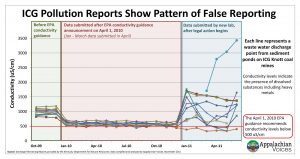Front Porch Blog
President-elect Trump announced last week that he has chosen Wilbur Ross, Jr., as the Secretary of Commerce. Ross, a billionaire investor, has strong ties to Central Appalachian coal and a history of disregard for regulations that protect miners, communities and the environment.
Ross purchased the Kentucky coal mining company Horizon Resources in 2004, when the company went bankrupt, and renamed it International Coal Group (ICG). Ross owned the company until 2011. During that period, ICG was one of several companies Appalachian Voices caught falsifying federally required water pollution reports. The discovery sparked a years-long string of legal cases against several of the largest mountaintop removal coal mining companies in Kentucky.
In 2010, we identified more than 10,000 violations of the Clean Water Act committed by ICG between 2008 and 2009. Appalachian Voices and our partners — Kentuckians for the Commonwealth, Kentucky Riverkeeper and Waterkeeper Alliance — filed a notice of intent to sue the company for its violations. The case was preempted by a settlement between ICG and the Kentucky Energy and Environment Cabinet for just 1,245 violations. In the settlement, the violations were blamed on “transcription errors” rather than on intentional falsification.
We later discovered an additional 4,000 violations that occurred in the first three months of 2011. Ross sold ICG to Arch Coal in June 2011, shortly after its last string of falsified data was submitted. Appalachian Voices and our partners were eventually granted the right to intervene in the state enforcement action against ICG and a settlement was reached in 2012 with the cabinet and Arch Coal. The settlement includes $575,000 in fines and instituted a robust third-party monitoring requirement for Clean Water Act compliance at all of ICG’s Kentucky mines.
Despite an early defense of “transcription errors,” more accurate water monitoring data later showed a spike in permit limit violations for common coal mining pollutants such as manganese, iron, pH and total suspended solids, demonstrating that the falsified data was covering up real water pollution issues.
False reporting was not the only water pollution issue at ICG mines. In 2011, the Sierra Club, Ohio Valley Environmental Coalition and West Virginia Highlands Conservancy sued ICG for excessive discharges of selenium, a pollutant toxic to aquatic life. The discharges occurred at an ICG mine in West Virginia and had been going on for years prior to 2011, including during Ross’s time as head of the company. That same year, the Sierra Club sued ICG for similar selenium discharges from a Kentucky mine.
And in 2006, still under Ross’s tenure, an ICG mine was the site of one of the worst mining accidents in recent history — the Sago Mine disaster, which killed 12 miners. The U.S. Mine Safety and Health Administration determined that better safety practices could have prevented the disaster. Despite these findings, a judge reduced the number of violations cited and decreased the fine to just $71,800.
This is also not the first time an ICG executive has been named to a government agency. Last year, Kentucky Governor Matt Bevin appointed Charles Snavely as the Energy and Environment Cabinet Secretary. Snavely held several different vice president titles at ICG during the Sago Mine accident and the string of water pollution cases. Now he runs the state agency that oversees enforcement at mines in Kentucky.
The mission of the U.S. Department of Commerce is to create conditions for economic growth and opportunity. If Trump truly believes that economic growth and opportunity can only be gained at the expense of worker safety, community health and clean water, he could make no better pick than Wilbur Ross.
PREVIOUS
NEXT
Related News

Leave a comment
Your email address will not be published. Required fields are marked *




Leave a Comment